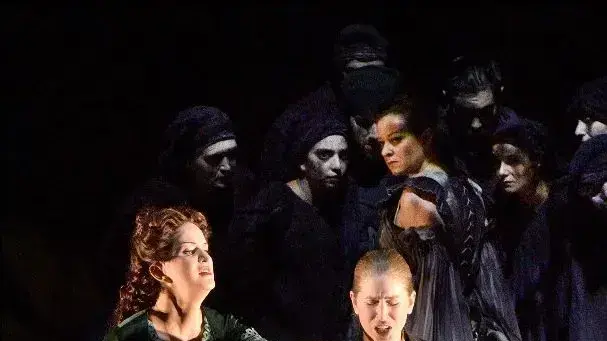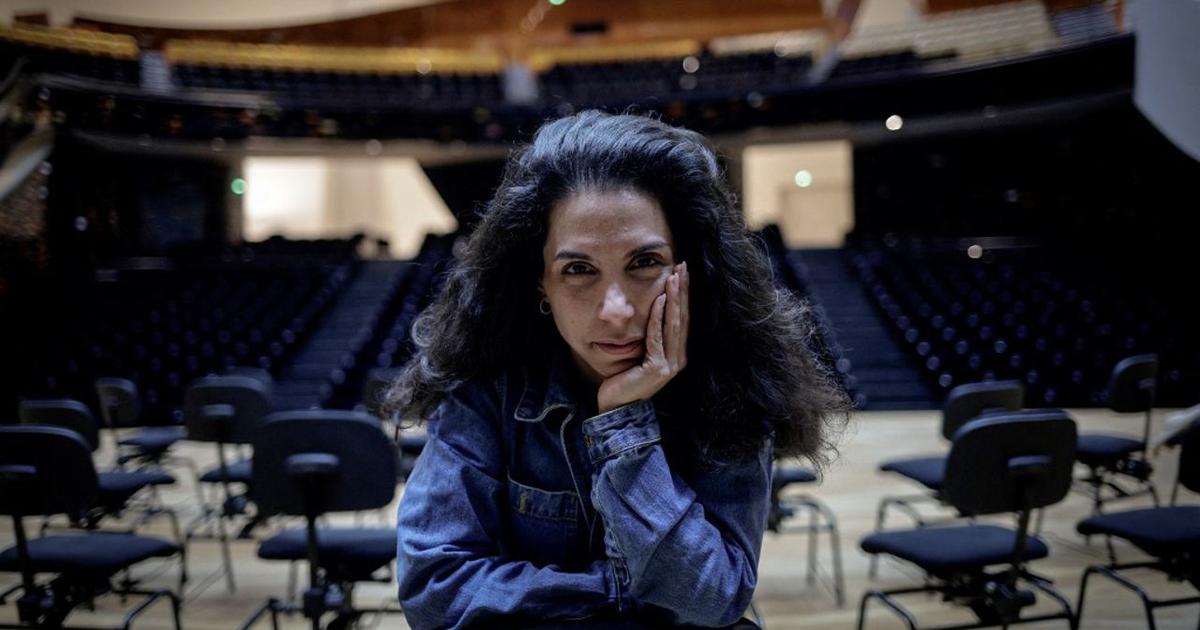As early as 1781 Mozart knew how to say "Okay Boomer" to the elders who came to destroy the world
The production of the "Idomeno" opera, which debuted this week at the Israeli Opera, is one big wow, at least visually, but it's hard not to think that Mozart would be disappointed with it
The end is good, the road to it is boring. From "Idumnau" (Photo: Yossi Tsbacker)
The Idomeno Opera (Photo: Yossi Tsevker, PR)
The crowd began to flow into the famous "La Scala" opera house in Milan. Minutes before the screen surfaced of Verdi's "two poscaras," it was learned that Italian conductor Miquel Mariotti was in severe flu and could not appear. There was a storm behind the scenes, how can one put on an opera without a winner? Fortunately for the production, tenor singer Francesco Mali (who played the opera Fascari Jr.) recalls a Milanese guy who worked as a conductor at the London Opera House. Local production people picked up phones for Covent Garden and finally managed to get the number of that young man named Mickle Gamba. Luckily, he was in town. Gamba didn't have to think twice, not every day being offered a win for Verdi at La Scala. He hopped on a taxi and raced to the mythical opera house. The audience was updated with the event and asked to wait patiently. It paid off. Despite the spontaneous bouncing, the 32-year-old Gamba drew applause from the crowd and the criticisms praised the acting presence.
This little anecdote comes to remind you how difficult classical musicians are to reach the high levels. There are few opportunities for young conductors to break through to the biggest stages. It is a difficult and arduous journey. Beyond the talent, you also need a lot of luck - just like Michele Gamba had in Milan that evening in 2016. Incidentally, the great Maestro Zubin Mehta also began his glorious career following the illness of another conductor, but this is another story to be told on another occasion.
This week, Gamba honored him for the first time for the Israeli Opera Orchestra in Mozart's new production of "Idomeno" opera, and like every Mozart piece - the first thing to remember is how young the Austrian genius was when he wrote all his masterpieces. In fact, Mozart, with his vast repertoire, did not even reach Michele's age. The "Idomeno" premiere was held at the Munich Opera House in 1781, two days after Mozart's 25th birthday. The composer himself conducted the orchestra. It is almost ironic to see how today's works written by young savages are entrusted to the hands of veteran and experienced musicians and performed in front of a largely older audience. It's easy to imagine that Mozart, a young man who wrote to young people (adult-funded), would find the humor in this whole thing.
More in Walla! NEWS More in Walla! NEWSRape, double murder and redemption: There is a reason why this is the most successful opera of the 21st century
To the full articleLetting go of the establishment. From "Idumnau" (Photo: Yossi Tsbacker)
The Idomeno Opera (Photo: Yossi Tsevker, PR)
You don't have to be a classical music expert to recognize Mozart's unique sound, but you do have to slip into one of the dozens of biographical compositions of the gifted composer to understand how much "Idomeno" is a personal and revealing work. The story from Greek mythology about the King of Crete who returns from the battlefield in Troy and is discussed by Neptune to kill his son Edamante must surely the young Mozart, in the shadow of his controversial relationship with his father Leopold. But Mozart deliberately changed the tragic ending of the original play - if originally the illustrious war hero kills his innocent son, in Mozart the filmmaking reversed: the people overthrow Idumnau from the throne, replacing Edmante instead. The peace-loving young man wins both the kingdom and his beloved Ilya, the daughter of the King of Troy. Dark opera, harsh, and even boring at times - but a happy and optimistic ending. This was the young composer's way in 1781 to speak out against the people of the military and religious establishment and say, "Okay Boomer."
The production of Danish director Casper Holten (with the reworking of Israeli Niv Hoffman), which debuted this week at the Israeli Opera, is one big wow, at least visually. Designer Maya Stenggrad's stage creates a world of several levels at different angles, in addition to a large mirror that reflects the stage from another angle to the audience - a bold choice befitting Mozart's music. The opera begins with Edmanta the boy who said no words to his father who goes to war. The next picture will already find Trojan Princess Ilya, played by a halo in Jiu, hanging between heaven and earth along with the other "losers" in the war. This is a role that needs more than a terrific soprano, but acting ability - and Gio is up to it successfully. The drama and somber music sometimes does not hurt Baggio's sound, which seems to have been created exactly for the role.
Casting a woman for the male role is distracting. From "Idumnau" (Photo: Yossi Tsbacker)
The Idomeno Opera (Photo: Yossi Tsevker, PR)
American Stephanie Lauricella entered the Premiere in Edmente's shoes (and pants) - in many ways the main character in the opera that drives her plot. The choice of a metro soprano for a metal role with the original Bavarian version performed by Castrato, but later Mozart "revised" the role and rewritten it to tenor - which clearly changes the character's sound. What's more, in the theatrical sense of the opera, it's strange to see a woman in the role of a man two women are fighting for his love, and maybe that's why Lauricella's role felt the most stripped down in her Israeli debut.
In the role of Idomeno, Finland-born actor Tomasz Katayala comes in, which was not only surprising because of his lucid tenor voice but also through a noteworthy methodical game. His heat-filled voice peaked in the famous "Fuor Del Mar" lion in the second act. The king sings about the sea rage that is stirring in his heart, and the combination of the vocal performance with the pathos-filled and security presentation has made the section one of the most exciting on the opera stage lately.
More in Walla! NEWS More in Walla! NEWSSexy French in Sensual Russian Performance: Israeli Opera Surprised for Good with "Menon"
To the full articleSo exciting. From "Idumnau" (Photo: Yossi Tsbacker)
The Idomeno Opera (Photo: Yossi Tsevker, PR)
But the opera's true columnist came up with "Andrò ramingo e solo" in the third set of the Mufti Ensemble ensemble, which finds the four main characters performing a quartet - something that is rare to none in the days when the opera was written. Mozart's choice to let the characters "explode" in a pathos full of emotion at that very moment became one of the most impressive pieces he ever wrote, and for the moment of his opera. In fact, it would be unthinkable that without the Quartet section we would not currently be counting "Idomeno" in line with Mozart's operatic masterpieces - "Don Giovanni", "Marriage of Figaro", "That's all" and "The Abduction of the Harmon."
And perhaps here, on the bottom line, should be a slight warning. "Idomeno" is an opera for benefactors. The lyrics are repetitive, the music is complex and gloomy and the whole simple plot can be summed up in two sentences and one hippie motto: Make love, not war, you old-fashioned Trojans. Yes, it's interesting to find Mozart's depth and wink between the lines, but in practice it's a grim, difficult opera and in the absence of subtler words: boring. The production is mostly impressive, the scenery is just as amazing and almost all the performers give their lives - yet it is hard not to feel that Mozart himself would not believe that more than two hundred years after his death, he still insisted on performing the opera of the serious and alienated genre, which he himself defined as obsolete and not. More exciting in his life.












